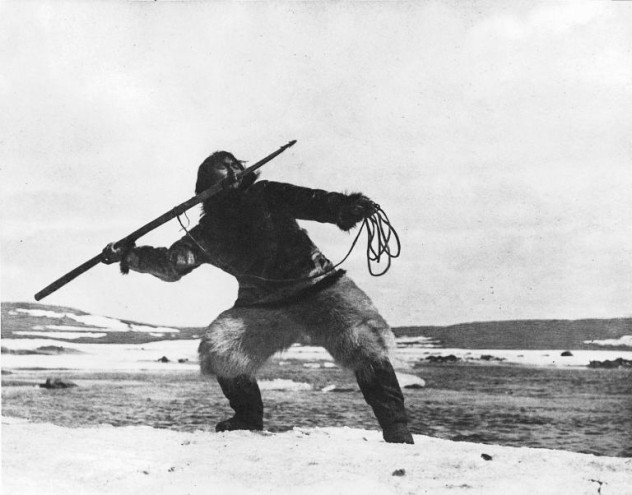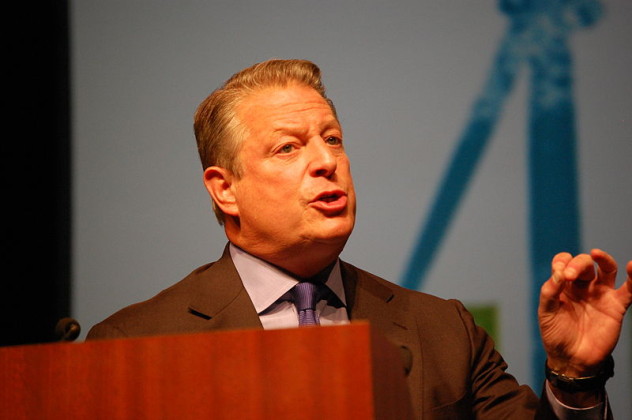 Our World
Our World  Our World
Our World  Crime
Crime 10 Dark Details of the “Bodies in the Barrels” Murders
 Animals
Animals The Animal Kingdom’s 10 Greatest Dance Moves
 Movies and TV
Movies and TV 10 Box Office Bombs That We Should Have Predicted in 2025
 History
History 10 Extreme Laws That Tried to Engineer Society
 History
History 10 “Modern” Problems with Surprising Historical Analogs
 Health
Health 10 Everyday Activities That Secretly Alter Consciousness
 History
History Top 10 Historical Disasters Caused by Someone Calling in Sick
 Animals
Animals 10 New Shark Secrets That Recently Dropped
 Movies and TV
Movies and TV 10 Forgotten Realities of Early Live Television Broadcasts
 Our World
Our World 10 Places with Geological Features That Shouldn’t Exist
 Crime
Crime 10 Dark Details of the “Bodies in the Barrels” Murders
 Animals
Animals The Animal Kingdom’s 10 Greatest Dance Moves
Who's Behind Listverse?

Jamie Frater
Head Editor
Jamie founded Listverse due to an insatiable desire to share fascinating, obscure, and bizarre facts. He has been a guest speaker on numerous national radio and television stations and is a five time published author.
More About Us Movies and TV
Movies and TV 10 Box Office Bombs That We Should Have Predicted in 2025
 History
History 10 Extreme Laws That Tried to Engineer Society
 History
History 10 “Modern” Problems with Surprising Historical Analogs
 Health
Health 10 Everyday Activities That Secretly Alter Consciousness
 History
History Top 10 Historical Disasters Caused by Someone Calling in Sick
 Animals
Animals 10 New Shark Secrets That Recently Dropped
 Movies and TV
Movies and TV 10 Forgotten Realities of Early Live Television Broadcasts
10 Big Documentaries Accused Of Skewing Their Facts
The humble documentary is a wonderful thing. It can offer a view into a world that is not our own, examine subcultures and the things that make them tick, or shine a light on issues that affect each and every one of us in different ways.
Unfortunately for those looking for a straight depiction of the facts, rare is the documentary that is made without having some form of bias behind it. The maker’s personal politics will often play a huge part in dictating the course of the film and, in the worst cases, they will actively misrepresent the information they have gathered to better suit their own argument. Here are 10 examples of documentaries that have been accused of skewing their facts.
10Bowling for Columbine

The documentary that brought Michael Moore worldwide fame (thanks to his examination of the American gun culture) was an unashamedly left-leaning piece of work. Moore aims to shine a light on the ease with which guns can be acquired, and the damage they have wrought in the US, especially on the poorer elements of society. Unfortunately, the overall message was somewhat overshadowed by accusations of glaring inaccuracies and manipulative editing.
Jarring instances of misrepresentations include the scene where Moore gets a gun for opening a bank account. This was eventually shown to have been staged, as the bank required Moore to undergo a background check, and he had to go to a nearby gun shop to actually collect his firearm. Moore’s triumphant exit of the bank, gun in hand, is accused of being a complete misrepresentation of the process he actually had to undertake to get the gun in the first place.
Extensive editing of a number of speeches given by Charlton Heston was also apparent in the film, in an effort to flow into Moore’s narrative regarding the NRA’s visit to Columbine following the school shootings, as can be seen in the opening part of this video where Heston’s suit and tie change. The rally that the film speaks out against had been set up months in advance of the school shooting in Columbine, meaning that nobody there could have known that the incident would occur.
9The Principle

The Principle takes on an extremely odd and outdated premise from the start, attempting to make the argument for a geocentric solar system in which the Sun apparently revolves around the Earth, rather than the other way around.
It attempts to demonstrate the proven fact that the Earth orbits the Sun as an assumption, and manages to get interview segments with a number of prominent physicists that it used to back up the points it makes.
The problem is that the interviews are extensively quote-mined, and some of those who appeared in the film did so after having been presented with a false pretense. Prominent physicist Lawrence Krauss was among those whose interviews were heavily edited to make it appear as though he lent some credence to the theory, when he had in fact spent a number of hours debunking it.
The film managed to get Kate Mulgrew, of Star Trek Voyager fame, to provide narration, but she later claimed that she was duped into providing the voice-over, and would not have participated if she had known the actual slant of the documentary.
8Nanook Of The North

This famous documentary is credited as being one of the most influential early examples of the genre and was certainly a predecessor to the more in-depth explorations of life and culture that would come later. It stands as one of the most fascinating silent films ever made and was lauded at the time for showing an unflinching record of the struggles of the Inuit tribe in the Arctic Circle.
Though marketed as being a true depiction of the life of an Inuit family, it was later revealed that much of the film was staged in an effort to better represent the makers’ preconceived notions of what life was like for the tribe.
In particular, the famed walrus hunt scene was almost entirely staged, with the Inuits being asked to use the traditional harpoons the tribe was apparently known for rather than the rifles they had taken to using at the time.
The misrepresentation became even more egregious when it was revealed that the women represented as Nanook’s wives in the film were actually not related to him at all. They were the common law wives of director Robert J. Flaherty.
7Super Size Me

Morgan Spurlock’s documentary shot him to worldwide fame thanks to its novel examination of the obesity crisis facing America today. In the film, Spurlock lays much of the blame squarely at the feet of the fast food industry, and undertakes a 30-day task of eating all of his meals from McDonald’s in an effort to demonstrate the effect such food could have on the human body.
Spurlock himself claimed that he was eating up to 5,000 calories every single day as part of the task, often making himself sick as a result. A press release from McDonald’s quickly reminded Spurlock and the champions of his film that eating 5,000 calories of any type of food every day would lead even the fittest of people into obesity before accusing the documentary of skewing the diets that most normal people have, and simply not representing anything of any scientific use at all.
The film inspired such anger in some parts due to its misrepresentation of the eating habits of normal people, and its grossly exaggerated levels of consumption, that it inspired comedian Tom Naughton to release the documentary Fat Head, in which he refutes the methods used by Spurlock, and also demonstrates how it is actually entirely possible to eat less than 2,000 calories per day at McDonald’s using the same rules that Spurlock created.
6Frozen Planet

For decades, the voice of David Attenborough has been the United Kingdom’s guide through the wonders of the animal kingdom. He has provided the narration for a slew of acclaimed documentary series, including the spectacular Planet Earth, which provided a look at life on every corner of the globe, and the similarly spellbinding Frozen Planet, which looked at the animals that live in some of harshest environments in the world.
Attenborough’s voice and the hard work of the crew who capture the footage used in the documentaries went unquestioned for years, until a scene in Frozen Planet depicting the birth of pair of polar bear cubs hit the headlines.
The documentary was accused of misleading the public in regard to the location of the birth, which actually took place at a zoo in Germany. To make matters worse, the film was also cut with film of polar bears that had legitimately been shot in the wild, again giving the viewer the impression they were witnessing a wild birth.
Once the news got out, the BBC was quick to point out that the filming procedure was “standard practice” for the industry, and that it would have been impossible to capture the birth in the wild. Though the company also revealed that only 50 of 12 million viewers had complained about the scene, the revelation still cast a question on just how many other scenes that Attenborough had narrated had been staged.
528 Days On The Pill

The film 28 Days on the Pill is a documentary that essentially aims to link oral contraceptive pills taken by millions of women with abortion. Perhaps unsurprisingly, the documentary as a whole contains a rather evangelical Christian slant and features a Christian worker interviewing a number of people, ranging from doctors to high school students in an effort to discover how the pill actually works.
Despite the core argument of attempting to link the pill to abortion at practically every turn, a number of pro-life doctors who appeared in the actual documentary itself were at best vague about the issue. Of course, the documentary generally failed to point out that legitimate medical studies have revealed that both the standard pill and the morning-after pill have an entirely different effect and do not cause abortions.
As such, the documentary—as can be seen in the video above—essentially uses the fact that most regular people don’t know exactly how the pill works as its “proof” that it causes abortions, while doing very little to back up its claims with legitimate medical facts.
4An Inconvenient Truth

David Guggenheim’s Oscar-winning documentary follows former US vice president Al Gore’s slideshow presentation relating to the effects of global warming, and the impact that it could have on the world at large if left unchecked. In many ways, it is an admirable effort to educate people about the argument for global warming and the issues that could be caused because of it. While the early reception was positive, early warning signs that something might be amiss were expressed in a paper by John W. Nielsen-Gammon, who pointed out that, though the overall message of the film was accurate, some of the scientific aspects were poorly researched or required updating.
Unfortunately, the documentary was accused of skewing a number of its facts, and treading an alarmist path in an effort to make its central point. This accusation was taken further in the United Kingdom, where a teacher in Kent attempted to ban the screening of the film in classrooms because of what he deemed to be scientific inaccuracies in some of the statements made in the film.
This action led to a court case in which London’s High Court found there were at least nine fundamental errors in the documentary that could be construed as an attempt to mislead people. While the court ruling did not ban the film from schools, it did cast doubt on a documentary that had otherwise been politically lauded.
3Expelled: No Intelligence Allowed
Expelled: No Intelligence Allowed is a documentary that aims to not only encourage the teaching of creationism in schools, but also alleges that the mainstream scientific community is actually repressing the evidence for intelligent design in an effort to ensure that only the theory of evolution is taught in schools.
The documentary stars Ben Stein, who makes a number of wild claims relating to how believing in evolution equates to fascism and could have been responsible for atrocities such as the Holocaust, which immediately drew scorn from a number of commentators.
Furthermore, many of the scientists who were interviewed as part of the movie allege that they were initially approached for the interview under the guise that their words would be shown in a film called Crossroads, which would have apparently taken an unbiased look at the issue. Contributors such as Michael Shermer and Richard Dawkins were quick to argue that their interviews were conducted under false pretenses, with Dawkins going so far as to create a video (that can be seen above) which demonstrated just how extensively his contributions had been quote-mined to fit the film’s overall narrative.
2The Greater Good

Autism has become something of a hot-button issue in recent years, particularly the debate that ranges around whether or not vaccinations lead to the condition. In fact, the issue has become so prominent in mainstream culture that minor celebrities, such as Jenny McCarthy, are quick to air their opinions about it. For a time, even the popular British satirical magazine Private Eye alleged that the link existed.
The Greater Good aims to establish that the link between vaccines and autism does exist, and it films interviews with a number of experts on the subject. The film was commended by the rather inappropriately named National Vaccine Information Center, and soon came under fire from a number of leading experts, including leading surgical oncologist David Gorski who went so far as to create a blog post on the film in which he slammed it for the level of inaccuracy it contained.
The documentary also continued with its premise despite the fact that the research conducted by Dr. Andrew Wakefield that first claimed that there was a link between the MMR vaccine and autism had quickly been utterly discredited upon its publication, leading to it being retracted by the Lancet medical journal altogether.
1The Great Global Warming Swindle

In contrast to the previously mentioned An Inconvenient Truth, The Great Global Warming Swindle is a British documentary that takes the opposite tack, and attempts to portray global warming as little more than an alarmist issue that has only been allowed to enter the mainstream consciousness thanks to funding and political issues. It also contests that global warming is a lie, and brings in a number of noted scientists to back up its claims.
The film was met with anger and opposition from many in the scientific community almost immediately after its release. John Houghton, who had worked with the Intergovernmental Panel on Climate Change and had noticed it was one of the film’s main targets, went so far as to deconstruct the entire premise of the film in a paper.
In addition to this, the film also made the assertion that the levels of carbon dioxide released from volcanoes far exceeds that which is caused by humans through man-made devices. The British Antarctic Survey quickly attacked the documentary for its erroneous use of data. The evidence in this case was so overwhelming that the international version of the film omitted the claim altogether, along with around 20 minutes of other footage, reducing its running length to only 52 minutes.
To top it all off, the film was also accused of quote-mining by a number of the scientists who were interviewed for it, with MIT professor of physical oceanography Carl Wunsch being among the most vocal opponents of the way his statements were represented in the film, to the point where he threatened legal action.
Lee Price is a writer for 411mania.com, WhatCulture and Starburst Magazine, which is published in the UK. He is currently working as a freelance writer. He hopes to one day fund his addiction to video games by writing about video games, and he maintains a sporadically updated blog








